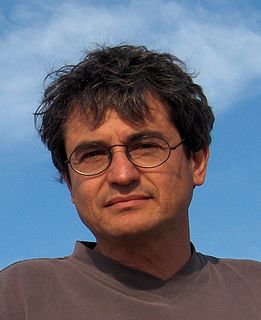A Quote by Carlo Rovelli
We never really see time. We see only clocks. If you say this object moves, what you really mean is that this object is here when the hand of your clock is here, and so on. We say we measure time with clocks, but we see only the hands of the clocks, not time itself. And the hands of a clock are a physical variable like any other. So in a sense we cheat because what we really observe are physical variables as a function of other physical variables, but we represent that as if everything is evolving in time.
Related Quotes
When the first mechanical clocks were invented, marking off time in crisp, regular intervals, it must have surprised people to discover that time flowed outside their own mental and physiological processes. Body time flows at its own variable rate, oblivious to the most precise hydrogen master clocks in the laboratory. In fact, the human body contains its own exquisite time-pieces, all with their separate rhythms. There are the alpha waves in the brain; another clock is the heart. And all the while tick the mysterious, ruthless clocks that regulate aging.
The time would not pass. Somebody was playing with the clocks, and not only the electronic clocks but the wind-up kind too. The second hand on my watch would twitch once, and a year would pass, and then it would twitch again. There was nothing I could do about it. As an Earthling I had to believe whatever clocks said -and calendars.
In this world, there are two times. There is mechanical time and there is body time." "They do not keep clocks in their houses. Instead, they listen to their heartbeats. They feel the rhythms of their moods and desires." "Then there are those who think their bodies don't exist. They live by mechanical time. They rise at seven o'clock in the morning. They eat their lunch at noon and their supper at six. They arrive at their appointments on time, precisely by the clock.
We all run on two clocks. One is the outside clock, which ticks away our decades and brings us ceaselessly to the dry season. The other is the inside clock, where you are your own timekeeper and determine your own chronology, your own internal weather and your own rate of living. Sometimes the inner clock runs itself out long before the outer one, and you see a dead man going through the motions of living.
You're different. You're more perfect. Time is three things for most people, but for you, for us, just one. A singularity. One moment. This moment. Like you're the center of the clock, the axis on which the hands turn. Time moves about you but never moves you. It has lost its ability to affect you. What is it they say? That time is theft? But not for you. Close your eyes and you can start all over again. Conjure up that necessary emotion, fresh as roses.
The Greeks had two words for time. Chronos is the time we usually keep an eye on. Kairos was our participation of time. Time that moves us so that we lose our sense of time; timeless time; moments at which the clocks seems to stop; feeding, renewing, more motherly time. It's the time with which we feel one instead of outside of it, the self, the tao, the love that connects us to others.
This required abandoning the idea that there is a universal quantity called time that all clocks measure. Instead, everyone would have his own personal time. The clocks of two people would agree if they were at rest with respect to each other but not if they were moving. This has been confirmed by a number of experiments, including one in which an extremely accurate timepiece was flown around the world and then compared with one that had stayed in place. If you wanted to live longer, you could keep flying to the east so the speed of the plane added to the earth
Life would go out in a 'fraction of a second' (that was the phrase), but all night he had been realizing that time depends on clocks and the passage of light. There were no clocks and the light wouldn't change. Nobody really knew how long a second of pain could be. It might last a whole purgatory--or for ever.



































